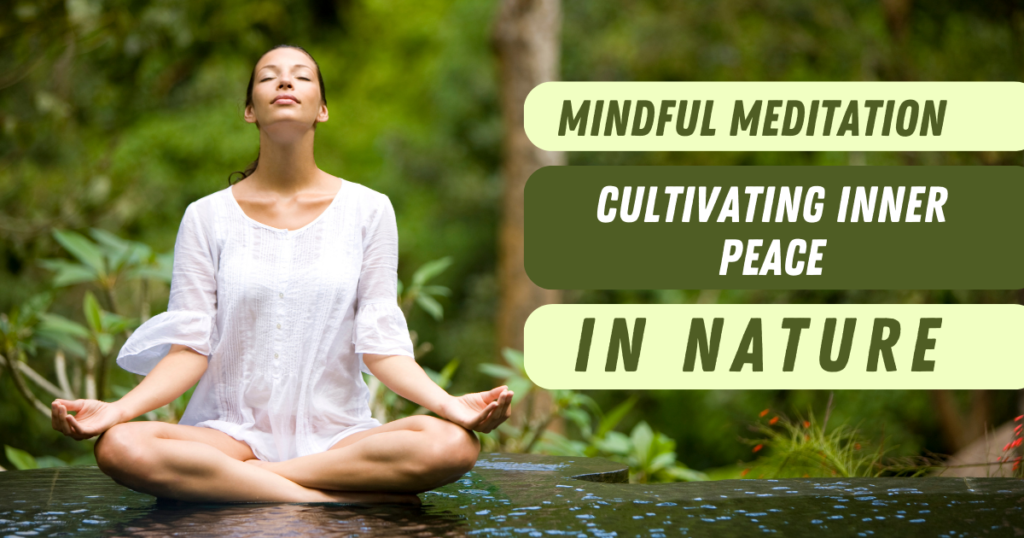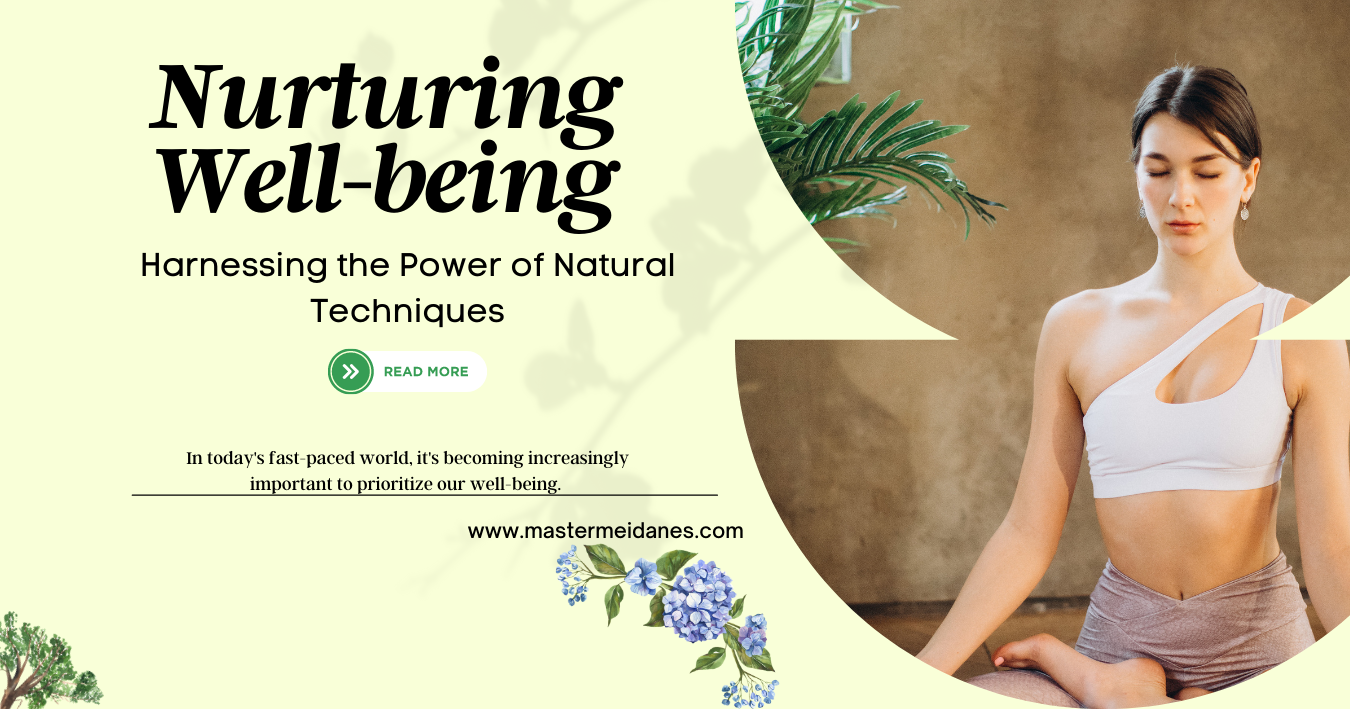In today’s fast-paced world, it’s becoming increasingly important to prioritize our well-being. While modern medicine and therapies have their place, there is a growing recognition of the power of natural techniques in nurturing our overall well-being. By incorporating these natural practices into our daily lives, we can find balance, reduce stress, and enhance our physical and mental health. In this article, we will explore the various natural techniques that can be harnessed to nurture our well-being and provide practical insights on how to incorporate them into our routines.
Table of Contents
Introduction
In our hectic lives, it’s easy to neglect our well-being. However, nurturing our physical, mental, and emotional health is crucial for leading a fulfilling life. While modern approaches have their merits, there is an abundance of natural techniques that can be harnessed to support our well-being. By incorporating these practices into our daily routines, we can experience transformative effects on our overall wellness.
Mindful Meditation: Cultivating Inner Peace

Mindful meditation is a practice that involves focusing our attention on the present moment, accepting it without judgment. It allows us to cultivate inner peace, reduce stress, and increase self-awareness. By dedicating a few minutes each day to mindful meditation, we can enhance our mental clarity and emotional resilience.
The Healing Power of Nature: Ecotherapy
Ecotherapy, also known as nature therapy, emphasizes the healing benefits of spending time in natural environments. Whether it’s walking in a park, gardening, or simply immersing ourselves in the beauty of nature, ecotherapy can reduce stress, improve mood, and boost our overall well-being.
The Art of Aromatherapy: Enhancing Mood and Relaxation
Aromatherapy utilizes the therapeutic properties of essential oils to promote relaxation, relieve stress, and uplift the mood. By diffusing essential oils, using them in massages, or incorporating them into bath rituals, we can harness the power of scent to enhance our well-being.
Reconnecting with Movement: Exercise and Physical Well-being
Physical exercise is not only essential for maintaining physical fitness but also plays a significant role in nurturing our mental and emotional well-being. Regular exercise releases endorphins, reduces stress, improves sleep quality, and boosts self-confidence. Finding a form of exercise that brings joy and suits our preferences ensures long-term commitment to a healthier lifestyle.
Embracing Herbal Remedies: Nature’s Pharmacy

For centuries, herbal remedies have been used to support and promote well-being. From soothing teas to herbal supplements, nature provides us with a vast array of plant-based remedies that can address various health concerns. Incorporating herbal remedies into our daily routines can help balance our bodies, boost our immune system, and alleviate common ailments.
Nurturing with Nutrition: Eating for Vitality
The food we consume has a direct impact on our well-being. By adopting a nutritionally balanced diet, rich in whole foods, fruits, vegetables, and lean proteins, we can provide our bodies with the necessary nutrients for optimal functioning. Eating mindfully and paying attention to our body’s cues can help us nourish ourselves from within and foster a sense of vitality.
The Joy of Journaling: Expressive Writing for Emotional Well-being
Expressive writing, often referred to as journaling, can be a powerful tool for promoting emotional well-being. By putting our thoughts and emotions onto paper, we gain clarity, release pent-up emotions, and gain a deeper understanding of ourselves. Journaling allows us to reflect, process experiences, and cultivate self-awareness.
Unwinding with Music: The Therapeutic Benefits
Music has a unique ability to influence our emotions and uplift our spirits. Listening to calming melodies or engaging in rhythmic activities like drumming or dancing can reduce stress, promote relaxation, and enhance our overall well-being. Incorporating music into our daily lives can be a simple yet effective way to nurture our mental and emotional health.
The Power of Positive Affirmations: Rewiring the Mind
Positive affirmations are empowering statements that we repeat to ourselves to cultivate a positive mindset and overcome self-limiting beliefs. By regularly affirming our strengths, abilities, and worth, we can rewire our minds and build resilience, self-confidence, and a positive outlook on life. Incorporating positive affirmations into our daily routines can transform our thoughts and enhance our overall well-being.
Embracing the Healing Touch: Massage Therapy
Massage therapy is an ancient practice that involves manipulating soft tissues to promote relaxation, reduce muscle tension, and alleviate pain. The therapeutic touch of a skilled massage therapist can not only provide physical benefits but also create a sense of calm, balance, and rejuvenation. Regular massage sessions can be a luxurious way to prioritize our well-being and indulge in self-care.
Discovering the Benefits of Acupuncture: Ancient Wisdom for Modern Well-being
Acupuncture, rooted in traditional Chinese medicine, involves inserting thin needles into specific points on the body to restore balance and promote healing. This ancient practice has gained recognition in Western medicine for its ability to alleviate pain, reduce stress, and address various health conditions. Exploring the benefits of acupuncture can open doors to holistic healing and well-being.
The Art of Tai Chi: Balancing Mind and Body
Tai Chi is a gentle and flowing martial art that combines slow movements, deep breathing, and meditation. This practice promotes harmony between mind and body, improves flexibility and balance, and cultivates a sense of inner peace. Incorporating Tai Chi into our lives can help reduce stress, enhance focus, and foster overall well-being.
Cultivating Gratitude: Enhancing Happiness and Well-being
Practicing gratitude involves consciously acknowledging and appreciating the positive aspects of our lives. By cultivating gratitude, we shift our focus from what we lack to what we have, leading to increased happiness, improved relationships, and overall well-being. Engaging in gratitude exercises, such as keeping a gratitude journal or expressing gratitude to others, can transform our perspective and nurture our well-being.
Conclusion
Nurturing our well-being is an ongoing journey that requires conscious effort and a holistic approach
By harnessing the power of natural techniques, we can cultivate balance, reduce stress, and enhance our physical, mental, and emotional health. Mindful meditation, ecotherapy, aromatherapy, exercise, herbal remedies, nutrition, journaling, music, positive affirmations, massage therapy, acupuncture, Tai Chi, and gratitude are just some of the many avenues available to nurture our well-being.
Incorporating these practices into our daily routines allows us to create a harmonious and holistic approach to self-care. It’s important to remember that each individual is unique, and what works for one person may not work for another. It’s essential to explore and discover the techniques that resonate with us personally.
In a world that often prioritizes productivity and external achievements, taking the time to nurture our well-being becomes an act of self-love and self-preservation. By incorporating these natural techniques into our lives, we can restore balance, find inner peace, and enhance our overall quality of life.
FAQs
1. How long should I meditate each day? It’s recommended to start with just a few minutes of meditation and gradually increase the duration as you feel comfortable. Even five minutes of daily meditation can make a difference in your well-being.
2. Are there any side effects of using herbal remedies? While herbal remedies are generally considered safe, it’s essential to consult with a healthcare professional or a qualified herbalist before incorporating them into your routine, especially if you have underlying health conditions or are taking medications.
3. Can anyone practice Tai Chi, regardless of age or fitness level? Yes, Tai Chi is suitable for people of all ages and fitness levels. Its gentle movements can be modified to accommodate different abilities, making it accessible to a wide range of individuals.
4. How often should I practice gratitude exercises? Practicing gratitude doesn’t have to be time-consuming. Taking a few moments each day to reflect on what you’re grateful for can have a significant impact on your overall well-being. Find a routine that works for you, whether it’s writing in a gratitude journal or expressing gratitude verbally to someone.
5. How can I incorporate these natural techniques into my busy schedule? Start by prioritizing your well-being and recognizing the importance of self-care. Look for small pockets of time throughout your day where you can engage in these practices. Whether it’s a short meditation during your lunch break or listening to uplifting music during your commute, finding moments to nurture your well-being is possible with mindful planning and commitment.

